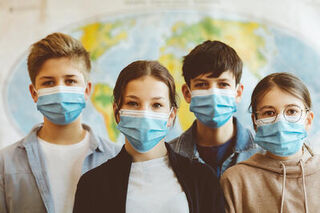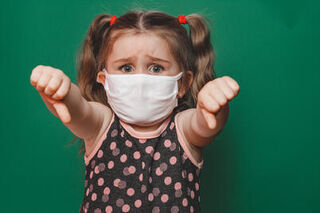Health
Does Masking Hurt Our Children’s Mental Health?
A psychologist’s perspective on masks and children.
Posted September 28, 2022 Reviewed by Tyler Woods
As a mother, I am deeply invested in the ongoing question of masking and its impact on our children. As a clinical psychologist, I feel compelled to lend my voice—and some important data—to the discussion.
My hope in doing so is to provide relevant information to people (especially parents!) that they may find useful as they navigate tough situations, weigh their options, and make important decisions. In Part 1, I discussed the potential effects of masking on children’s developing social cognition, communication skills, and social connection; here, I address the implications of masking on their mental health.
Self-esteem
When a young child engaged in group play suddenly feels left out, they may make an instantly recognizable pout as their lower lip sticks out into an upside-down U-shape.
A parent or teacher from across the room may see this pout and asks the child what happened, helping them to verbalize their experience and potentially guiding them to practice skills to remedy the situation (“Let’s tell Grayson it’s not nice to take toys away from people, but we’ll also let him know he can play with the toy in five minutes so the two of you can share.”)
Similarly, when a young child discovers something simple and wonderful, such as the joy of building a tower 10 blocks tall, they may display a gleeful, infectious smile—stimulating a parent or teacher to draw near, smile back, squeeze their chubby cheeks and say, “Yes, you’re building an amazing tower, aren’t you?!”
These experiences are subtly communicating to children that their experience matters to others. Even if we do read the situation despite the masks and make a face of sympathy as we walk over to help, the child cannot read (or even see!) the empathy on our faces as we approach. Nor can the child who has taken the toy learn from our faces that his behavior has triggered a very specific response in the adults around him. It is challenging for that child to learn that their behavior is perceived as hurtful to others.
We can convey this with words–but children are often somewhat pre-verbal, and sometimes there’s truly nothing like a friendly face to say a thousand words in a single moment.

Of course, a child’s experience matters to us, even if the child is masked. But by masking the child, we’re losing one of the child’s key tools of communicating their experience to us. So, we may inadvertently become less responsive.
As adults, we understand that people don’t respond to our smiles or frowns when we’re masked because our facial expressions are largely invisible. This is more difficult for children to constantly bear in mind—moreover, in the examples above, the child isn’t necessarily consciously searching for an adult to respond. The adult’s response is an unexpected enhancement to the child’s experience that simultaneously models social cognition while also communicating to the child that they matter.
I’m concerned that removing a key component of our ability to notice and respond to children’s facial displays of happiness or distress could inadvertently create an environment that doesn't respond to children’s basic facial expressions, posing a threat to their self-esteem.
Emotional flattening
I fear that if facial expressions repeatedly fail to yield normal supportive responses by adults or playmates for children, then facial expressions may become less rewarding to make. Children may become less inclined to make them with the same frequency or intensity as before we began masking them for hours on end.
In psychology, the facial feedback hypothesis states that while some facial expressions arise from emotions, emotions can also be informed by making facial expressions. Sometimes your body “knows” how you feel first (this is why holding your face in a woeful expression may evoke sadness, and smiling more often may improve your mood).
I’m concerned that tampering with children’s ability to have rewarding socio-emotional experiences through normal facial expressions could lead to decreased facial expressions and an emotional flattening where children are simply less emotionally (and socially) engaged with the world around and within them.

Anxiety and depression
The factors covered in Part 1 and Part 2 of this post could create a sense of isolation and disconnection—which would set the stage for depression and anxiety (the Surgeon General’s recent report confirms a spike in these issues for children since the pandemic).
If children don’t have opportunities to learn how to navigate social situations when adults don’t respond to their unseen facial expressions, and if children are deprived of normal “face-to-face” social interactions, then how could we be surprised when they experience an increase in feelings of isolation and disconnection?
Conclusion
I’ve heard parents say they’ve been guided by “professionals” that it is better for their children if they act like frequent masking is fine and normal. After all, kids take their cues from the adults they trust.
In contrast, I’m concerned that signaling to our children that the regular, ongoing masking of their nose and mouth is healthy or normal is invalidating their natural awareness that covering their face, as well as becoming effectively blind to the facial expressions of others is not “normal and healthy,” especially in an environment where children are not generally vulnerable to serious harm from Covid and adults have their choice of vaccines and antiviral treatments. Some parents say their children "like" wearing masks—however, some adolescents also like to shut themselves in their room all day while scarfing down candy bars, and parents don't accept this as normal or healthy. Part of the work of adolescence is overcoming awkwardness with yourself, and sometimes overcoming introversion (taken too far, introversion increases vulnerability to depression and anxiety). Simply shrugging our shoulders and saying, "Oh, the child says they like wearing a mask so I guess that means it's okay," doesn't reassure me as a psychologist.
I understand the pandemic hasn’t been easy for anyone, that there are exceptions to every rule, and that there is no panacea. Each person has to do what is right for their particular situation, and I’m all in favor of parents weighing their options before making whatever choice is best for their family. But as a clinical psychologist and mother, I felt the need to share these points of concern—especially because it seems that speaking up for the side of concerns about masking children is somehow taboo in our current climate. I want parents to at least have the knowledge that other perspectives exist. I truly welcome ideas from all sides, and this article is in no way intended to be comprehensive. The point here is just to raise awareness about the potential implications of masking children, especially for multiple hours daily on a frequent, ongoing basis.




